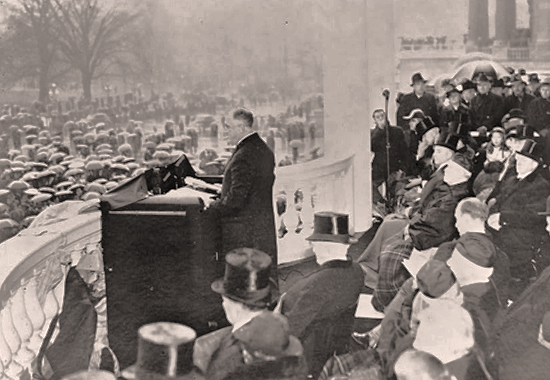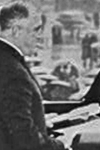|

ACCOMPANIED BY FREEZING RAIN -
FRANKLIN D. ROOSEVELT 1937
FDR's Second Inaugural Address

 |
When four years
ago we met to inaugurate a President, |
the Republic,
single-minded in anxiety, stood in spirit here.
We dedicated ourselves to the fulfillment of a
vision--to speed the time when there would be
for all the people that security and peace
essential to the pursuit of happiness. We of the
Republic pledged ourselves to drive from the
temple of our ancient faith those who had
profaned it; to end by action, tireless and
unafraid, the stagnation and despair of that
day. We did those first things first.
Our covenant with ourselves did not stop there.
Instinctively we recognized a deeper need--the
need to find through government the instrument
of our united purpose to solve for the
individual the ever-rising problems of a complex
civilization. Repeated attempts at their
solution without the aid of government had left
us baffled and bewildered. For, without that
aid, we had been unable to create those moral
controls over the services of science which are
necessary to make science a useful servant
instead of a ruthless master of mankind. To do
this we knew that we must find practical
controls over blind economic forces and blindly
selfish men.
We of the Republic sensed the truth that
democratic government has innate capacity to
protect its people against disasters once
considered inevitable, to solve problems once
considered unsolvable. We would not admit that
we could not find a way to master economic
epidemics just as, after centuries of fatalistic
suffering, we had found a way to master
epidemics of disease. We refused to leave the
problems of our common welfare to be solved by
the winds of chance and the hurricanes of
disaster.
In this we Americans were discovering no wholly
new truth; we were writing a new chapter in our
book of self-government.
This year marks the one hundred and fiftieth
anniversary of the Constitutional Convention
which made us a nation. At that Convention our
forefathers found the way out of the chaos which
followed the Revolutionary War; they created a
strong government with powers of united action
sufficient then and now to solve problems
utterly beyond individual or local solution. A
century and a half ago they established the
Federal Government in order to promote the
general welfare and secure the blessings of
liberty to the American people.
Today we invoke those same powers of government
to achieve the same objectives.
Four years of new experience have not belied our
historic instinct. They hold out the clear hope
that government within communities, government
within the separate States, and government of
the United States can do the things the times
require, without yielding its democracy. Our
tasks in the last four years did not force
democracy to take a holiday.
Nearly all of us recognize that as intricacies
of human relationships increase, so power to
govern them also must increase--power to stop
evil; power to do good. The essential democracy
of our Nation and the safety of our people
depend not upon the absence of power, but upon
lodging it with those whom the people can change
or continue at stated intervals through an
honest and free system of elections. The
Constitution of 1787 did not make our democracy
impotent.
In fact, in these last four years, we have made
the exercise of all power more democratic; for
we have begun to bring private autocratic powers
into their proper subordination to the public's
government. The legend that they were
invincible--above and beyond the processes of a
democracy--has been shattered. They have been
challenged and beaten.
Our progress out of the depression is obvious.
But that is not all that you and I mean by the
new order of things. Our pledge was not merely
to do a patchwork job with secondhand materials.
By using the new materials of social justice we
have undertaken to erect on the old foundations
a more enduring structure for the better use of
future generations.
In that purpose we have been helped by
achievements of mind and spirit. Old truths have
been relearned; untruths have been unlearned. We
have always known that heedless self-interest
was bad morals; we know now that it is bad
economics. Out of the collapse of a prosperity
whose builders boasted their practicality has
come the conviction that in the long run
economic morality pays. We are beginning to wipe
out the line that divides the practical from the
ideal; and in so doing we are fashioning an
instrument of unimagined power for the
establishment of a morally better world.
This new understanding undermines the old
admiration of worldly success as such. We are
beginning to abandon our tolerance of the abuse
of power by those who betray for profit the
elementary decencies of life.
In this process evil things formerly accepted
will not be so easily condoned. Hard-headedness
will not so easily excuse hardheartedness. We
are moving toward an era of good feeling. But we
realize that there can be no era of good feeling
save among men of good will.
For these reasons I am justified in believing
that the greatest change we have witnessed has
been the change in the moral climate of America.
Among men of good will, science and democracy
together offer an ever-richer life and
ever-larger satisfaction to the individual. With
this change in our moral climate and our
rediscovered ability to improve our economic
order, we have set our feet upon the road of
enduring progress.
Shall we pause now and turn our back upon the
road that lies ahead? Shall we call this the
promised land? Or, shall we continue on our way?
For "each age is a dream that is dying, or one
that is coming to birth."
Many voices are heard as we face a great
decision. Comfort says, "Tarry a while."
Opportunism says, "This is a good spot."
Timidity asks, "How difficult is the road
ahead?"
True, we have come far from the days of
stagnation and despair. Vitality has been
preserved. Courage and confidence have been
restored. Mental and moral horizons have been
extended.
But our present gains were won under the
pressure of more than ordinary circumstances.
Advance became imperative under the goad of fear
and suffering. The times were on the side of
progress.
To hold to progress today, however, is more
difficult. Dulled conscience, irresponsibility,
and ruthless self-interest already reappear.
Such symptoms of prosperity may become portents
of disaster! Prosperity already tests the
persistence of our progressive purpose.
Let us ask again: Have we reached the goal of
our vision of that fourth day of March 1933?
Have we found our happy valley?
I see a great nation, upon a great continent,
blessed with a great wealth of natural
resources. Its hundred and thirty million people
are at peace among themselves; they are making
their country a good neighbor among the nations.
I see a United States which can demonstrate
that, under democratic methods of government,
national wealth can be translated into a
spreading volume of human comforts hitherto
unknown, and the lowest standard of living can
be raised far above the level of mere
subsistence.
But here is the challenge to our democracy: In
this nation I see tens of millions of its
citizens--a substantial part of its whole
population--who at this very moment are denied
the greater part of what the very lowest
standards of today call the necessities of life.
I see millions of families trying to live on
incomes so meager that the pall of family
disaster hangs over them day by day.
I see millions whose daily lives in city and on
farm continue under conditions labeled indecent
by a so-called polite society half a century
ago.
I see millions denied education, recreation, and
the opportunity to better their lot and the lot
of their children.
I see millions lacking the means to buy the
products of farm and factory and by their
poverty denying work and productiveness to many
other millions.
I see one-third of a nation ill-housed,
ill-clad, ill-nourished.
It is not in despair that I paint you that
picture. I paint it for you in hope--because the
Nation, seeing and understanding the injustice
in it, proposes to paint it out. We are
determined to make every American citizen the
subject of his country's interest and concern;
and we will never regard any faithful
law-abiding group within our borders as
superfluous. The test of our progress is not
whether we add more to the abundance of those
who have much; it is whether we provide enough
for those who have too little.
If I know aught of the spirit and purpose of our
Nation, we will not listen to Comfort,
Opportunism, and Timidity. We will carry on.
Overwhelmingly, we of the Republic are men and
women of good will; men and women who have more
than warm hearts of dedication; men and women
who have cool heads and willing hands of
practical purpose as well. They will insist that
every agency of popular government use effective
instruments to carry out their will.
Government is competent when all who compose it
work as trustees for the whole people. It can
make constant progress when it keeps abreast of
all the facts. It can obtain justified support
and legitimate criticism when the people receive
true information of all that government does.
If I know aught of the will of our people, they
will demand that these conditions of effective
government shall be created and maintained. They
will demand a nation uncorrupted by cancers of
injustice and, therefore, strong among the
nations in its example of the will to peace.
Today we reconsecrate our country to
long-cherished ideals in a suddenly changed
civilization. In every land there are always at
work forces that drive men apart and forces that
draw men together. In our personal ambitions we
are individualists. But in our seeking for
economic and political progress as a nation, we
all go up, or else we all go down, as one
people.
To maintain a democracy of effort requires a
vast amount of patience in dealing with
differing methods, a vast amount of humility.
But out of the confusion of many voices rises an
understanding of dominant public need. Then
political leadership can voice common ideals,
and aid in their realization.
In taking again the oath of office as President
of the United States, I assume the solemn
obligation of leading the American people
forward along the road over which they have
chosen to advance.
While this duty rests upon me I shall do my
utmost to speak their purpose and to do their
will, seeking Divine guidance to help us each
and every one to give light to them that sit in
darkness and to guide our feet into the way of
peace.

More History
|
|